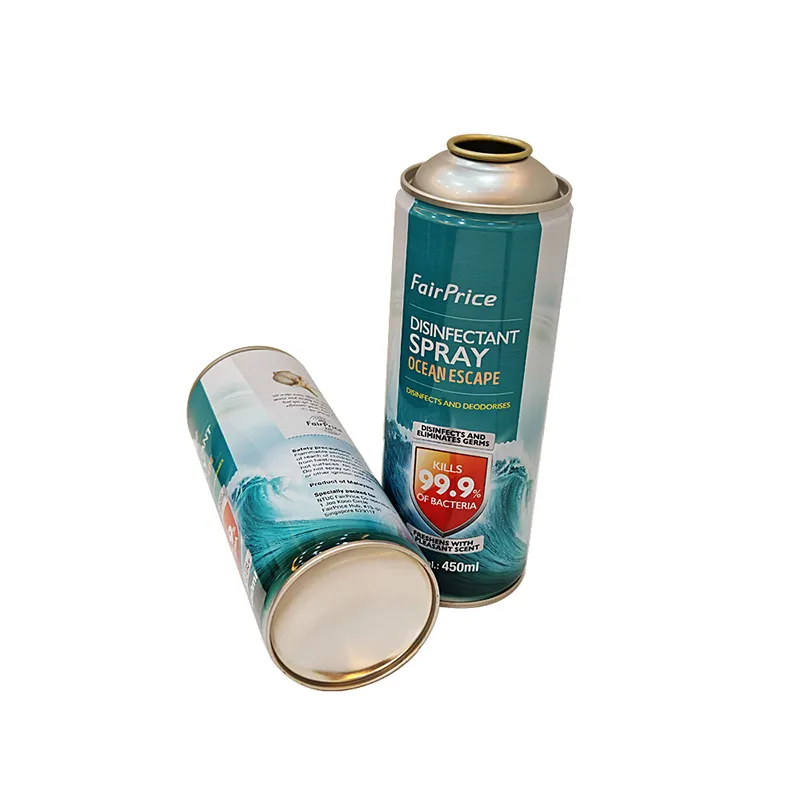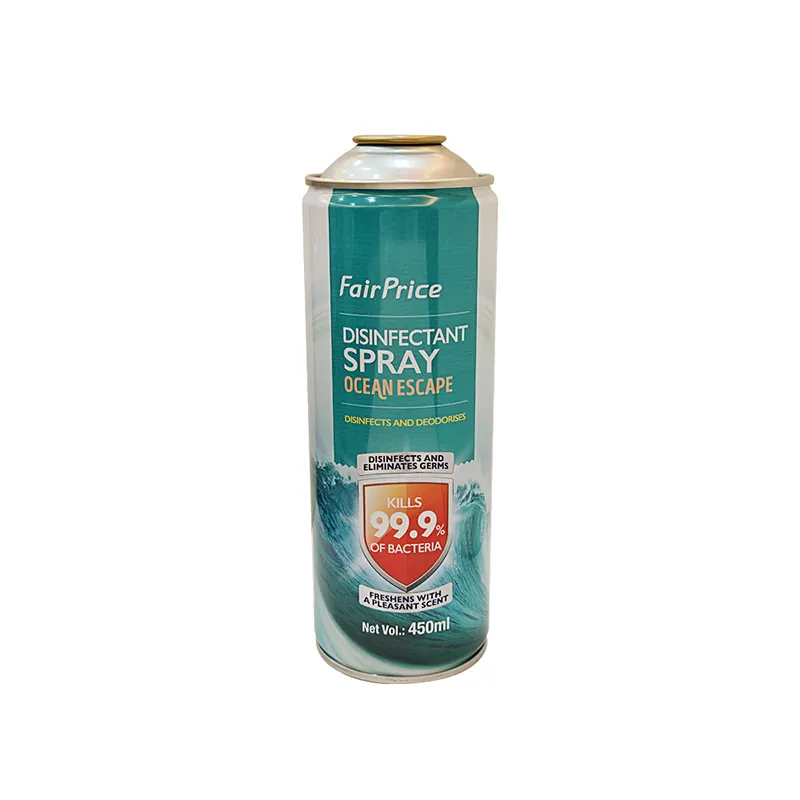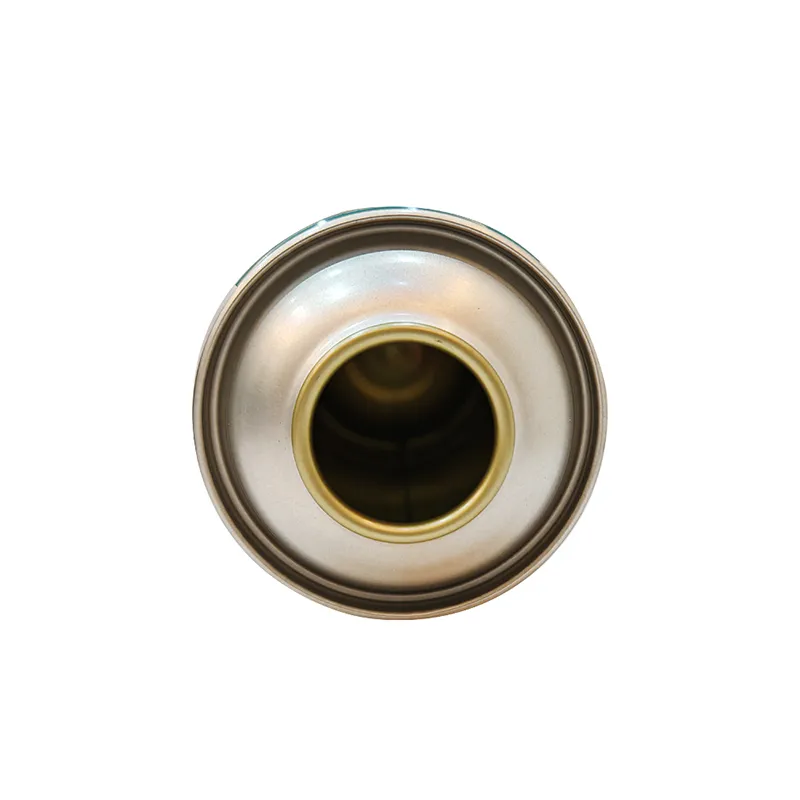As a common form of packaging, aerosol cans are widely used in all aspects of daily life, from cosmetics, household cleaners to industrial sprays. The convenience and versatility of aerosol cans make them popular. Among them, tinplate, as one of the main manufacturing materials of aerosol cans, has become an ideal container for various liquid and gas products due to its excellent physical properties, durability and corrosion resistance.
So, what can be put in aerosol cans made of tinplate? This article will explore this issue in depth from the material properties of tinplate aerosol cans, their application fields and the different types of substances that can be carried.

What are the material properties of tinplate aerosol cans?
Before understanding what can be put in tinplate aerosol cans, you first need to understand the material properties of tinplate and why it is suitable for making aerosol cans. Tinplate is a composite material with a layer of tin on the surface of low-carbon steel. It has the strength of steel and the corrosion resistance of tin, so it is widely used in packaging in the fields of food, chemicals, cosmetics, etc. The following characteristics of tinplate make it an ideal material for manufacturing aerosol cans:
High strength and pressure resistance
Aerosol cans are usually filled with compressed gas or liquefied gas, so the can body must have sufficient strength to withstand the internal pressure. Tinplate has excellent mechanical strength, which can maintain the integrity of the aerosol can under normal use conditions and prevent the can body from deforming or breaking.
Good anti-corrosion performance
Many substances in aerosol cans are corrosive, such as detergents, pesticides or chemical reagents. The tin coating on the surface of tinplate can effectively prevent steel from directly contacting corrosive substances, extend the service life of the aerosol can, and ensure the stability of the substances in the can.
Excellent sealing performance
Tinplate aerosol cans use a special sealing process to ensure that the gas and liquid inside will not leak. This sealing is the key to the function of the aerosol can, because any leakage will cause the pressure in the can to drop, affect the spraying effect, and may even cause safety problems.
Environmental protection and recyclability
Although the environmental protection of tinplate aerosol cans is not the core factor in discussing the substances that can be filled, tinplate has the characteristics of 100% recyclability. Aerosol cans can be recycled and reused after use, which is particularly important for the growing environmental awareness in modern society.

What are the application areas of tinplate aerosol cans?
Based on the material properties of tinplate, aerosol cans are widely used in a variety of industries and fields. Different types of aerosol cans have significantly different internal filling materials for different product categories. The following are the applications of tinplate aerosol cans in various fields and the types of materials they can be filled with:
Personal care products
Tinplate aerosol cans are widely used in personal care products. From common hair products to body sprays, aerosol cans are popular with consumers because of their portability and convenience.
● Hair spray: such as hairspray, styling spray, etc. When packaging these hair sprays containing chemical ingredients, tinplate aerosol cans can ensure the stability of the product and prevent the contents from deteriorating or chemical reactions.
● Body spray: such as deodorant, sunscreen spray, perfume spray, etc. These products usually contain ingredients such as alcohol, which are corrosive to the material, but the anti-corrosion properties of tinplate make it an ideal packaging material for such products.
Household and industrial cleaners
Tinplate aerosol cans are also widely used in the cleaner industry, especially those containing chemical reagents or gases.
● Household cleaners: such as kitchen cleaners, bathroom descaling agents, air fresheners, etc. These products may contain irritating or corrosive ingredients. Tinplate aerosol cans ensure that the cleaners can be stored for a long time and maintain their effectiveness through their corrosion resistance and sealing properties.
● Industrial cleaners: such as metal surface cleaners, degreasers, lubricants, etc. The chemical composition of these products is more complex, and some are even highly corrosive. Tinplate cans can not only carry these ingredients, but also store them safely under high pressure.
Cosmetics and beauty products
Tinplate aerosol cans are also very common in the cosmetics and beauty industries. Many cosmetics need to be applied in the form of sprays.
● Toner spray: This type of product is usually a water-based spray, requiring the can body's sealing and corrosion resistance to ensure the purity of the product. Tinplate aerosol cans perform well in this regard, and can effectively prevent the toner in the can from being contaminated by the outside air.
● Hair products: such as hair dyes, hair sprays, etc. Hair dyes usually contain certain chemicals that may corrode packaging materials. Tinplate aerosol cans can preserve these chemical ingredients for a long time due to their good corrosion resistance.
Food industry
Although aerosol cans are not as common in the food industry as in other fields, some specific foods and beverages do use tinplate aerosol cans for packaging.
● Cream spray: Aerosol cans are often used for spraying cream and other dairy products. Tinplate aerosol cans can maintain the quality and safety of food and ensure that the pressure in the can can be released evenly.
● Seasoning spray: such as cooking oil spray, vinegar spray, etc. These food-grade aerosol cans need to ensure the safety of the inner wall material. Tinplate, as one of the food-grade packaging materials, can meet the safety requirements of these products.
Medicines and health products
Tinplate aerosol cans also have certain applications in the fields of medicine and health products, especially those that need to be inhaled in the form of sprays.
● Spray medicines: such as nasal sprays, throat cleaning sprays, etc. Pharmaceutical products have extremely high requirements for packaging materials. Tinplate aerosol cans must not only have excellent sealing properties, but also ensure that the medicine in the can is pure and pollution-free.
Chemical products
Aerosol cans are often used in the chemical industry to store and distribute chemical preparations. Tinplate aerosol cans have outstanding durability and corrosion resistance in such applications.
● Paint spray: Paint products contain more chemical solvents, which are easy to corrode the can body. The anti-corrosion properties of tinplate aerosol cans enable them to safely carry these substances and ensure the effectiveness of the product.
● Insecticides: The chemical components in insecticides have a certain impact on the human body and the environment, so their packaging materials must have extremely high safety and sealing properties. Tinplate aerosol cans can ensure the safety and effectiveness of insecticides during use.
Car care products
In the field of car care, tinplate aerosol cans are used to store various care sprays and lubricants.
● Car cleaners: such as window cleaners, tire cleaners, etc. These products need to have strong cleaning capabilities. Tinplate aerosol cans can safely release cleaners under high pressure to ensure their effectiveness.
● Lubricating sprays: such as anti-rust sprays, lubricating oil sprays, etc. The main ingredients of these products are oils or other lubricants. Tinplate cans can ensure that the lubricants remain active for a long time.

What are the filling requirements for tinplate aerosol cans?
Although tinplate aerosol cans can carry many different types of liquids and gases, in actual operation, strict safety standards and process procedures need to be followed when filling these substances.
Pressure control
The body of the aerosol can must work at a specific pressure, and the manufacturing process of the tinplate can body determines its pressure bearing capacity. When filling gas, it must be ensured that the pressure in the can does not exceed its design upper limit.
Sealing process
Sealing is a key step to ensure the safe use of aerosol cans. After filling, the can mouth must be tightly sealed to avoid leakage during transportation or storage.
Inner wall treatment
Some chemical components may corrode tinplate, so the inner wall of the can usually requires special treatment, such as spraying an anti-corrosion coating to ensure that the substance does not come into direct contact with the metal.

